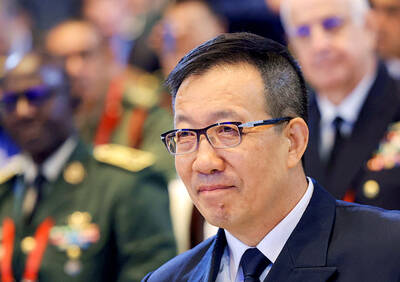A man accused of taking part in a riot over land grabs in a southern Chinese village has died in police custody, threatening to fan tension in a small pocket of Guangdong Province that has become a source of persistent unrest.
The man died as riot police moved to quell a longstanding dispute in Wukan village on the coast of the booming province and economic powerhouse, where commercial and industrial development has consumed swathes of rice paddies.
Villagers say hundreds of hectares have been acquired unfairly by corrupt officials in collusion with powerful developers over the past few years.
The government in Shanwei, an area that includes Wukan in its jurisdiction, said that Xue Jinbo (薛錦波) fell ill on Sunday, his third day in detention over the riot. Hospital doctors later pronounced him dead.
In an apparent effort to head off further trouble in the area that saw hundreds of riot police fire tear gas to dispel protesting, rock--pelting villagers on Sunday, officials immediately notified Xue’s family and offered aid.
“The cause of death was cardiac failure and other causes of death have been provisionally ruled out,” the notice on the Shanwei City Government Web site said, citing doctors.
The death in custody nonetheless threatens to stir fresh tensions and has already generated an angry Internet backlash.
“We’re very pained and angry at his death,” said one villager who declined to be named, given the fear of reprisals by authorities. “He didn’t commit any crime. He was just a negotiator speaking with the government, trying to get our land back. He was defending farmers’ rights.”
Though the Chinese Communist Party has ruled over decades of economic growth that have shielded it from challenges to its power, the country is confronted by thousands of smaller-scale protests and riots every year that chip away at party authority at the grassroots, where discontent is often fed by land and property disputes.
One expert on unrest, Sun Liping (孫立平) of Beijing’s Tsinghua University, has estimated that there could have been more than 180,000 such “mass incidents” last year, but most estimates from Chinese academics and government experts put recent numbers at about 90,000 annually in 2009 and last year.
The government has not given any statistics. In any case, the real worry for Chinese authorities is not the number of such protests, but their tendency to become more persistent and organized — as in the unrest in Wukan village, which has persisted over months.
Pictures on microblogging sites from Wukan on Sunday showed large numbers of riot police standing off with thousands of residents, some armed with sticks and spades, who are demanding the return of their farmland.

DEADLOCK: Putin has vowed to continue fighting unless Ukraine cedes more land, while talks have been paused with no immediate results expected, the Kremlin said Russia on Friday said that peace talks with Kyiv were on “pause” as Ukrainian President Volodymyr Zelenskiy warned that Russian President Vladimir Putin still wanted to capture the whole of Ukraine. Meanwhile, US President Donald Trump said that he was running out of patience with Putin, and the NATO alliance said it would bolster its eastern front after Russian drones were shot down in Polish airspace this week. The latest blow to faltering diplomacy came as Russia’s army staged major military drills with its key ally Belarus. Despite Trump forcing the warring sides to hold direct talks and hosting Putin in Alaska, there

North Korea has executed people for watching or distributing foreign television shows, including popular South Korean dramas, as part of an intensifying crackdown on personal freedoms, a UN human rights report said on Friday. Surveillance has grown more pervasive since 2014 with the help of new technologies, while punishments have become harsher — including the introduction of the death penalty for offences such as sharing foreign TV dramas, the report said. The curbs make North Korea the most restrictive country in the world, said the 14-page UN report, which was based on interviews with more than 300 witnesses and victims who had

COMFORT WOMEN CLASH: Japan has strongly rejected South Korean court rulings ordering the government to provide reparations to Korean victims of sexual slavery The Japanese government yesterday defended its stance on wartime sexual slavery and described South Korean court rulings ordering Japanese compensation as violations of international law, after UN investigators criticized Tokyo for failing to ensure truth-finding and reparations for the victims. In its own response to UN human rights rapporteurs, South Korea called on Japan to “squarely face up to our painful history” and cited how Tokyo’s refusal to comply with court orders have denied the victims payment. The statements underscored how the two Asian US allies still hold key differences on the issue, even as they pause their on-and-off disputes over historical

BEIJING FORUM: ‘So-called freedom of navigation advocated by certain countries outside the region challenges the norms of international relations,’ the minister said Chinese Minister of National Defense Dong Jun (董軍) yesterday denounced “hegemonic logic and acts of bullying” during remarks at a Beijing forum that were full of thinly veiled references to the US. Organizers said that about 1,800 representatives from 100 countries, including political, military and academic leaders, were in Beijing for the Xiangshan Forum. The three-day event comes as China presents itself as a mediator of fraught global issues including the wars in Ukraine and Gaza. Addressing attendees at the opening ceremony, Dong warned of “new threats and challenges” now facing world peace. “While the themes of the times — peace and development —